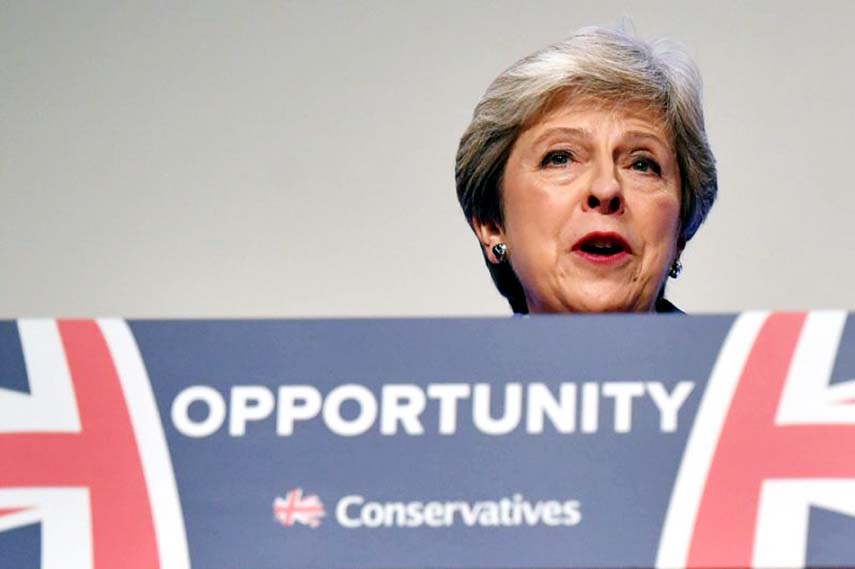
AFP, Birmingham :
Prime Minister Theresa May appealed for her bickering party on Wednesday to unite at the “toughest phase” of negotiations aimed at averting economic chaos once Britain leaves the European Union in six months.
May danced a little jig to the strains of ABBA’s “Dancing Queen” as she approached the podium for her address at the ruling Conservative Party’s annual gathering.
It was a self-deprecating dig at the ribbing she got for her robotic dancing during a visit to Africa. It also appeared aimed at showing the prime minister to be at ease and in charge at a momentous moment for Britain.
“We are entering the toughest phase of the negotiations,” May said, drawing firm applause.
“If we stick together and hold our nerve, I know we can get a deal that delivers for Britain.” It was one of the biggest speeches of her political career. May is buffeted from all directions, with European officials anxious that the two sides are heading for a messy divorce.
Following warnings of the potentially calamitous impact a no-deal Brexit would have on trade, France’s budget minister admitted on Tuesday that Paris was preparing “for the worst”.
But May’s immediate concern was to regain the confidence of her party and present a united front in crucial negotiations with Brussels over the next two weeks.
She mixed optimism with a show of determination in a sweeping hour-long address.
“I passionately believe that our best days lie ahead of us and that our future is full of promise,” May said.
Yet May currently has a mini-revolt on her hands from some members of her party as well as facing pressure from EU officials determined to stick to their guns.
Eurosceptic MPs led by former foreign minister Boris Johnson have held a string of packed fringe meetings to argue against May’s proposal for Britain to follow EU trade rules on goods after it leaves.
Johnson and others say such a close partnership would ignore the wishes of voters who backed the Brexit referendum in 2016. They want a clean break.
EU officials argue that May is asking for too much: “cherry-picking” the benefits of a union while still leaving the bloc.
May insists her ideas offer the only way to protect jobs and trade while also avoiding physical checks on Britain’s land border with EU member Ireland.
“Even if we do not all agree on every part of this proposal, we need to come together,” May said. The prime minister is also preparing new proposals on a plan B to keep the frontier open if and until a new trade deal could be agreed with the EU.
Speculation is growing that London may accept some checks on goods passing between British-ruled Northern Ireland and the rest of Britain.
These are meant to avoid such checks on the border between Northern Ireland and Ireland itself-something all sides want to avoid.
But Northern Ireland’s Democratic Unionist Party (DUP) on Tuesday appeared to reject the idea outright-a prospect that could kill any arrangement May reaches with the EU.
May’s party depends on the DUP for its majority in the House of Commons. MPs must approve any final Brexit deal.
But May also has her share of heavyweight supporters both inside the party and Brussels who think any alternative to her plan would make matters far worse.
May has surprised observers by surviving this far and many delegates at the conference-whatever their feelings on Brexit-are wary of a change at the top now.
“We underestimated Mrs. May’s resilience,” a senior European official told AFP.
Johnson, who quit as foreign secretary in July, drew cheers from 1,500 delegates on Tuesday when he called May’s proposal for close post-Brexit economic ties an “outrage” that would leave Britain manacled to the EU and unable to strike new trade deals around the world.
May acknowledged that Johnson’s speech had made her “cross” but said she was sticking to her Brexit blueprint, which would keep Britain aligned to many EU rules in return for remaining in the bloc’s single market for goods.
She argues that her plan is the only way to avoid customs checks along the currently invisible border between the U.K.’s Northern Ireland and EU member Ireland – a development that would be troublesome for residents and businesses on both sides, and could undermine Northern Ireland’s peace process.
But the EU is demanding new proposals from Britain before it signs a deal – and many Conservatives are in no mood to compromise.
May has had a tough year since a disastrous 2017 conference speech, when she was her plagued by a cough and interrupted by a prankster while parts of the backdrop fell down as she was speaking.
Wednesday’s speech was considerably smoother. May even poked fun at her robotic public image – cemented when her awkward dance moves on a trip to Africa went viral – by busting a move as she took the stage to Abba’s “Dancing Queen.”
In a nod to voters who are tired of stagnating wages and spending cuts, May said that from next year the government would end the austerity policies introduced after the 2008 global financial crisis and put more money into public services.
She painted an optimistic picture of post-Brexit Britain, saying “I passionately believe that our best days lie ahead of us and that our future is full of promise.”
Her own future remains full of uncertainty. Johnson’s speech was a leadership pitch in all but name, and many Conservatives expect May to face a party coup soon after Brexit day – or even before, if there is no progress toward a deal.
Conservative lawmaker James Duddridge on Wednesday called the Brexit negotiations “an absolute disaster” and said Johnson’s speech had been “inspirational.”
“We need a strong leader and we haven’t got that at the moment,” Duddridge told the BBC.
“My support for her is wearing thin to the point of being invisible.”

